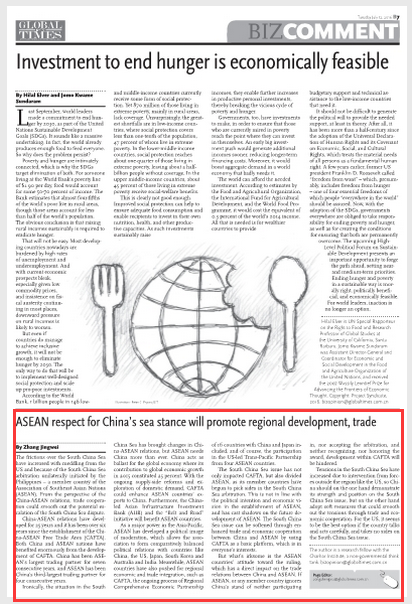Major Power Relations
Your Present Location: PROGRAMS> Major Power RelationsZhang Jingwei: ASEAN respect for China’s sea stance will promote regional development, trade
By Zhang Jingwei Source: Global Times Business Published: 2016-07-12
The frictions over the South China Sea have increased with meddling from the US and because of the South China Sea arbitration unilaterally initiated by the Philippines - a member country of the Association of Southeast Asian Nations (ASEAN). From the perspective of the China-ASEAN relations, trade cooperation could smooth out the potential escalation of the South China Sea dispute.

China-ASEAN relations have developed for 25 years and it has been over six years since the establishment of the China-ASEAN Free Trade Area (CAFTA). Both China and ASEAN nations have benefited enormously from the development of CAFTA. China has been ASEAN`s largest trading partner for seven consecutive years, and ASEAN has been China`s third-largest trading partner for four consecutive years.
Ironically, the situation in the South China Sea has brought changes in China-ASEAN relations, but ASEAN needs China more than ever. China acts as ballast for the global economy where its contribution to global economic growth in 2015 constituted 25 percent. With the ongoing supply-side reforms and exploration of domestic demand, CAFTA could enhance ASEAN countries` exports to China. Furthermore, the China-led Asian Infrastructure Investment Bank (AIIB) and the "Belt and Road" initiative will benefit ASEAN countries.
As a major power in the Asia-Pacific, ASEAN has developed a political image of moderation, which allows the association to form comparatively balanced political relations with countries like China, the US, Japan, South Korea and Australia and India. Meanwhile, ASEAN countries have also pushed for regional economic and trade integration, such as CAFTA, the ongoing process of Regional Comprehensive Economic Partnership of 16 countries with China and Japan included, and of course, the participation in the US-led Trans-Pacific Partnership from four ASEAN countries.
The South China Sea issue has not only impacted CAFTA, but also divided ASEAN, as its member countries have begun to pick sides in the South China Sea arbitration. This is not in line with the political intention and economic vision in the establishment of ASEAN, and has cast shadows on the future development of ASEAN. The South China Sea issue can be softened through enhanced trade and economic cooperation between China and ASEAN by using CAFTA as a basic platform, which is in everyone`s interests.
But what`s irksome is the ASEAN countries` attitude toward the ruling, which has a direct impact on the trade relations between China and ASEAN. If ASEAN, or any member country ignores China`s stand of neither participating in, nor accepting the arbitration, and neither recognizing, nor honoring the award, development within CAFTA will be hindered.
Tensions in the South China Sea have increased due to intervention from forces outside the region like the US, so China should on the one hand demonstrate its strength and position on the South China Sea issue, but on the other hand adopt soft measures that could smooth out the tensions through trade and economic cooperation. For the US, it seems to be the best option if the country talks and acts carefully, and takes no sides on the South China Sea issue.
The author is a visiting fellow of Chongyang Institute for Financial Studies at Renmin University of China.
Key Words: South China Sea; ASEAN; trade























































































 京公网安备 11010802037854号
京公网安备 11010802037854号





